- Home
- Tim LaHaye
The Rising: Antichrist is Born / Before They Were Left Behind Page 7
The Rising: Antichrist is Born / Before They Were Left Behind Read online
Page 7
That wouldn’t do, however, in the matter of her current need. Adoption was an option, of course, but she ruled it out except as a last resort. It had come to Marilena over the past several months that this child she longed for had to be flesh of her flesh. She wanted to experience pregnancy, birth, breast-feeding, nurturing her own child and being loved by it.
That was way too much to lay on Sorin, of course, especially when he had entirely misread her. She would wait several weeks, then broach the subject again, just to test the waters. It would be hypocritical of him to deny her a relationship that would result in a pregnancy, but that was no longer the issue. He had made it plain years before that he wanted no more children, and she didn’t think the technicality of its being someone else’s child would make a difference.
Marilena couldn’t bring herself to unfold her whole plan, the idea of a brief pragmatic affair. The concept remained so bizarre to her that it was impossible to put into words. Oh, she knew there were men who would sleep with any woman for any reason. Even a plain one like her. But what kind of men were they? What genes might join hers in the creation of a new life? Those from a drunk, a scoundrel, a rounder, someone who slept around?
A sperm bank was the answer. She would have an idea of the background, nationality, profession, even IQ of the donor. But Marilena was not even prepared to speak of that to Sorin. It was not her pregnancy or where it originated that would matter to him. It would be the issue of bringing a newborn into their lives.
And if he forbade it? If he left her? How would she support herself and a baby when she would be out of work for a time? And when she returned to work, how would she afford child care? Despite the fact that this was a longing of the heart, Marilena could not let emotion get in the way of the practicalities. Frankly, she didn’t imagine herself a working mother anyway—at least not outside the home. Surely with her gifts she could find work that could be done via the Internet.
Ideally, though, staying with Sorin, not having to move, his supporting them—that made the most sense. But would he agree?
SIX
RAY STEELE felt like a fool. Here he was, one of the cool fourth graders, and yet he was being a baby.
His mother had dragged him along on an errand run. Normally he didn’t mind, because she mostly let him wait in the car. And when she did ask him to save her some time by running into one store while she dashed into another, it was only to be sure they were home in time for dinner and the stuff he wanted to do that night.
Today she had asked him to pick up batteries in the hardware store while she went to a gigantic home-interiors warehouse. Ray was then to wait in the car. “I shouldn’t be more than half an hour,” she said.
“Half an hour!” he said. “Come on, it’s not really gonna take that long, is it?”
She ignored him, and while that infuriated him, he knew it was the best way to deal with his new attitude. Deep down what he really wanted was for his mom or dad to engage with him, argue with him. When they were indifferent or gave up—like when his dad would conclude, “Oh, no one can even talk to you”—Ray immediately regretted being so obstinate. He wanted anything but to be ignored.
But the way his mother did it was effective. She wouldn’t say anything nasty or express exasperation. She merely pretended she had not heard him. That kept the back and forth from escalating to where Ray would realize how ridiculous he was, respond in anger, and say stupid things he couldn’t take back. He had even made her cry, which made him feel like an idiot.
Sure, she was an old mom, and she was old-fashioned. She still called him Rayford most of the time. At least that was better than Raymie, which is what she had called him until he was about six. She had even made the mistake of recently calling him that in front of his friends, and he feared he would never hear the end of that.
But Ray knew his mom really cared about him and loved him in her own way. He didn’t dwell on it, but if pushed he would have to admit that life would be awful without her in his corner.
Ray found the batteries and opted for self-checkout. He tossed the bag onto the front seat and stretched out in the back, trying to avoid being noticed in that old car by anyone he knew. He slouched, reading Extreme Sports magazine. Ray preferred the major sports, but he also enjoyed watching skateboarders and bikers and snowboarders on TV, so the magazine was all right. Still, he nodded and dozed, finally tossing the magazine aside.
He awoke with a start, sweating as the sun toasted him through the window. His mother had been gone a lot longer than thirty minutes. Ah, well, she couldn’t be far away and wouldn’t be long. The store was directly in line with where she had parked, so he’d see her as soon as she emerged. Ray thumbed through the magazine again but soon couldn’t concentrate.
As his solar-powered watch pushed past the forty-five-minute mark, Ray couldn’t remain in the car. He stood outside, leaning against it, not caring who saw him. Of course, no one did, despite how conspicuous he felt. Ray studied every woman who came out of the store, almost every one initially looking like his mother.
When an hour had passed, he used the car phone to dial her cell. He heard her phone ring in the car. She had left it between the seats. He called his dad. No answer. Just his voice mail. He tried his dad’s office. Closed.
Why did he feel so nervous? Nothing could have happened to his mother. Could it? Not in public. Maybe the store was crowded. She was probably in a long checkout line. That had to be it. But she didn’t come and didn’t come. Finally, scolding himself for being such a nervous Nellie, Ray moseyed into the store.
It was cavernous and, surprisingly, not that crowded. He looked up and down the aisles. Soon he decided to start at the far end and walk every inch of the place. His mother was nowhere to be seen. Ray’s pulse raced, his breath shortened. What was this? There would be a simple explanation, so why was he so panicky?
He began to imagine horrible things. Kidnapping. Murder. And, he was shocked to admit to himself, he found one other option even worse. What if Ray’s mother had abandoned him? simply left him? She and his dad had had it with him and had taken off. If and when he called the police and made his way home, he would discover the house empty and his parents gone forever.
What was the matter with him? That was ludicrous. Yet why did it seem so logical and possible? And why did it seem so absurdly worse to him than his imaginings of horrible fates befalling his mother?
Ray was overcome by fear but also by a surprising love and deep longing for his mother. What am I, four years old? Get a grip!
But he couldn’t get a grip, and as the minutes dragged by, his anxiety soared to where he could only pray. Sobs in his throat, and he knew he must look like a fool, a string bean of a young boy wandering a home-decorating outlet, red-faced, eyes full.
The last thing Ray wanted was to ask someone for help. Besides not knowing whom to ask, what would he say? How would he say it? Would he look like a baby? Would he dissolve into tears? And what would he do if his mother showed up in the middle of all that, having simply lost track of the time?
He used a public phone that automatically charged the Steeles’ home phone bill and tried his dad’s cell phone again. Same result. And there was no answer at home. He called the store he was in and felt like a fool, pretending to be elsewhere and asking for a customer.
“We can page her if it’s an emergency,” he was told.
“Well, it sort of is.”
“Sort of? What’s the nature of the emergency, son?”
He didn’t know what to say.
“Is this a crank call?”
“No, I—”
“Caller ID shows this is coming from inside our store. Now—”
Ray hung up and quickly moved away from the phone bank. He had to leave. There wasn’t a single other customer who looked like he might place such a call. In fact, he didn’t see another male—other than store personnel.
Ray hurried back out to the car, relieved to see the batteries still on the front
seat. Wouldn’t that have been great, to endure this and have those stolen too? He turned in a circle, surveying the parking lot, sweating, in full crisis now.
Finally Ray climbed into the toasty car and stretched out across the backseat again. He could no longer stanch the tears. As he cried, he prayed aloud, “God, help me! Please bring my mother back. I’ll do anything you want. I’ll quit swearing. I’ll quit sassing. I’ll go to church and really listen.”
Ray buried his face in the crook of his elbow, his shoulders heaving. He kept telling himself to go back into the store and get help. But almost as bad as fearing his mother had abandoned him—and his dad being in on it—was the prospect of looking like such a wuss.
As he lay sobbing, he heard footsteps and the driver’s door opening. “Oh, Rayford,” his mother said, “you’re sleeping.”
He quickly wiped his face and sat up. “I’m awake.”
“I’m so sorry,” she said, tossing her packages on the passenger’s seat. “You wouldn’t believe what happened.” She started the car without looking at him, and he was relieved. Relieved that she was alive, that she was here, that he had been wrong. Had God answered his prayer? Ray was amazed at how quickly he regretted making all those promises, especially when his mother’s return seemed so plain and hardly miraculous.
“What happened?” he said.
“Well, it’s embarrassing. I was on my way out of the store, thought I saw someone I knew, and hesitated. As it turned out, it wasn’t her anyway, but when I stopped, the door caught my heel and tore the flesh just above the shoe line. I was bleeding, Rayford. How bizarre. A clerk came running and took me to the employees’ lounge in the back, and the assistant manager was most helpful. He cleaned the wound and bandaged me up. I felt so silly.”
“I wondered where you were.”
“Oh, you probably slept through the whole thing, Rayford. I’m limping a little, but it’s just a surface wound and I’ll be good as new by morning.”
“Yeah.”
“I hate to think what your father will say.”
“Um-hm.”
“Well, I can see this elicits no sympathy from my loving son.”
She had no idea. Ray was so grateful that he didn’t know what to say or do. “You should have taken your phone, Ma. You forgot it again.”
“Oh, I know. I thought about calling the car, but with the engine off—”
“Well, if you’d had your phone, I could have called you!” Ray swore.
“Now, honey—”
“You’re just so scatterbrained,” he said.
“Well, I’m sorry. I might have expected a little more understanding.”
“Yeah, sure, like I get from you.”
Again she ignored him. What had gotten into him? What had happened to his fear, his promises to God, his relief? He was angry to have had to endure all that, and for what? A stupid, silly little accident his absentminded mom could have avoided.
Ray hated himself. What kind of crybaby was he? And what kind of an ungrateful son?
If there was really a God, why hadn’t He just let Ray find his mother? Was this His idea of answering a prayer? Ray had never felt more like a child. Maybe there was a God, but He sure didn’t seem to make any sense, not in the Bible and not here and now in real life.
All that made Ray feel like a fraud, and he didn’t understand himself. His love for his mother, his desperation when she was away, had shown itself in anger and bitterness when she returned.
He turned his guns on his dad at dinner. “Why couldn’t I get through to you on your cell phone this afternoon?”
“You tried calling your dad?” his mother said. “What for? When? And from where?”
“Oh, I was just wondering about something. I don’t even remember what now. And what difference does that make? Mom, sometimes, really . . .”
“Where’d you call from? We don’t need more phone bills.”
Knowing it would show up on the bill, Ray said, “I tried from the car and then from the store you were in.”
“What did you want?”
“Who cares? That’s not the point! Why didn’t you have your phone on, Dad?”
“I did, Ray. Just calm down. I was on an important call with a supplier in Ohio, if you must know, and it took the entire ride home.”
“Oh.”
“Oh, what? Are you sorry for scolding me before you knew what was going on?”
“Whatever.”
“That describes your whole attitude these days,” his dad said.
That was for sure.
__
Ray couldn’t concentrate the rest of the night. He didn’t enjoy watching sports on TV, didn’t enjoy reading his aviation books, wasn’t able to relax, and seemed to take forever to get to sleep. This had to be the worst time in his life. Why couldn’t he just be grateful that he had been wrong, his mother had not abandoned him, she was still there, still loved him, would be there for him?
He felt himself retreating farther and farther into his shell. He felt guilty about making promises to God that he may have meant at the time but now seemed crazy and empty. He had no intention of keeping them.
It was one of those rare Tuesday afternoons when Marilena’s and Sorin’s workdays ended nearly simultaneously. Marshaling her courage, Marilena poked her head into his office. “Would you consider walking me home?”
He grimaced. “Why would I want to do that? I mean, I have my bike here, and you always take the bus. . . .”
“Never mind.”
“No! I don’t mean it personally, Marilena. It’s just that—”
“Well, can’t you take the bus back here with me in the morning too? Your bike will be fine.”
“I suppose. But why?”
“I just need the exercise and prefer not to walk alone,” she said.
“Come, come,” he said. “I know you better than that. Something troubling you?”
“Yes.”
Sorin loaded his bag and slung it over his shoulder. On their way past Dr. Baduna Marius’s door, Sorin said, “I’m walking home. We’re still on for tonight.”
Baduna nodded and smiled, but he would not look at Marilena. That told her Sorin had informed Baduna that she knew. How awkward. They had to work together. Well, she decided, if Sorin and Baduna could make it work at the office, she certainly could too.
Marilena had not formulated an approach and found herself at a loss for words for the first several blocks of their trek.
“Let’s not waste this disruption of my routine,” Sorin finally said.
“I know,” she said, “but I didn’t take into account how long it’s been since I walked this far. Would you mind terribly if we stopped somewhere?”
“Well, I’m hardly hungry yet,” he said, steering her toward a park bench. “Come on, out with it.”
“Oh, Sorin, I can’t be badgered into a serious discussion. You’re impatient from the beginning. How is that supposed to make me feel?”
“As if I am weary of the game playing and the serious talks,” he said. “We are married in name only. It’s a convenience for both of us, but frankly it is more convenient for you than for me.”
“I’m sorry to hear that.”
“Don’t act as if it’s news, Marilena. I appreciate that you uphold your end of the expenses and that we help each other out. You know full well that I would rather be married to Baduna, but who knows how long it will be before that could become a reality? I appreciate you, consider you a fine person, and enjoy scholarly discussions with you. I do not, however, look forward to these heart-to-hearts.”
Marilena hated that her voice had a tear in it and would make her sound weak. “Perhaps I should spare you then.”
“Oh, please. Save the histrionics. At the very least you have piqued my curiosity.”
Marilena sighed and looked away. Finally, “I want a serious talk. I don’t want to merely satisfy your curiosity.”
“All right. I’m here. I’m not happy; I’m
eager to get home, but I’m here.”
“That is hardly conducive to constructive conversation.”
Sorin leaned forward and rested his chin in his hands. “My dear, I have not had a constructive conversation with you, aside from academic subjects, for years. Now don’t cry. I didn’t intend for that to hurt you. You know I tell the truth at any expense.”
“Even my feelings.”
“Frankly, yes.”
She shook her head. “Can you imagine how difficult this is for me, your wanting me to just get on with it?”
“As long as we’re being direct,” he said, “imagine how difficult this is for me. Whatever it is, it’s an interrupter. I can’t imagine caring, and yet I will feel obligated to pretend I do.”
“Am I really that much of a burden, Sorin?”
“Sometimes. Occasionally, yes.”
“You want me to leave, don’t you? I don’t want to be a burden.”
“Leave or stay,” he said, “but please abandon the frequent personal revelations.”
Marilena couldn’t imagine a crueler husband, aside from one who might beat her. “You don’t care what goes on inside me?”
“I don’t, Marilena. I’m sorry, but I don’t. In your mind, perhaps, because you are a careful student and an articulate thinker. But in what you call your heart or soul or whatever it is you are trying to nurture? No. It bores me.”
“But this pertains to you.”
“How can it if I don’t care?”
“Because it would affect you, Sorin!”
“Not if I don’t let it. You know where I stand on all this spiritual prostie.”
“Foolery? That’s what you think it is?”
“Of course, and you know it. And unless you have lost your mind, you agree.”

 Glorious Appearing: The End of Days
Glorious Appearing: The End of Days Left Behind: A Novel of the Earth's Last Days
Left Behind: A Novel of the Earth's Last Days Kingdom Come: The Final Victory
Kingdom Come: The Final Victory Nicolae: The Rise of Antichrist
Nicolae: The Rise of Antichrist Desecration: Antichrist Takes the Throne
Desecration: Antichrist Takes the Throne Mark's Story: The Gospel According to Peter
Mark's Story: The Gospel According to Peter Babylon Rising
Babylon Rising Thunder of Heaven: A Joshua Jordan Novel
Thunder of Heaven: A Joshua Jordan Novel The Edge of Darkness
The Edge of Darkness Apollyon: The Destroyer Is Unleashed
Apollyon: The Destroyer Is Unleashed Armageddon: The Cosmic Battle of the Ages
Armageddon: The Cosmic Battle of the Ages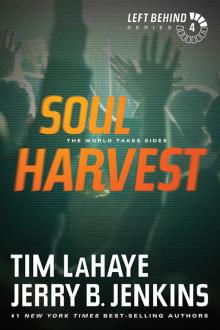 Soul Harvest: The World Takes Sides
Soul Harvest: The World Takes Sides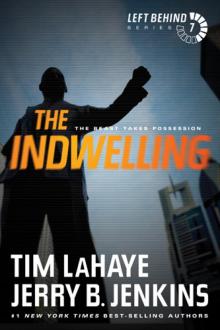 The Indwelling: The Beast Takes Possession
The Indwelling: The Beast Takes Possession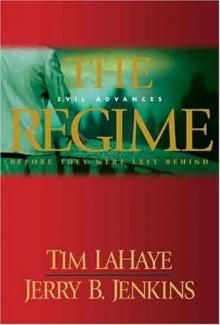 The Regime: Evil Advances
The Regime: Evil Advances The Rapture: In the Twinkling of an Eye / Countdown to the Earth's Last Days
The Rapture: In the Twinkling of an Eye / Countdown to the Earth's Last Days The Remnant: On the Brink of Armageddon
The Remnant: On the Brink of Armageddon John's Story: The Last Eyewitness
John's Story: The Last Eyewitness The Europa Conspiracy
The Europa Conspiracy Mark of Evil
Mark of Evil Brink of Chaos
Brink of Chaos The Mark: The Beast Rules the World
The Mark: The Beast Rules the World 04 The Edge of Darkness
04 The Edge of Darkness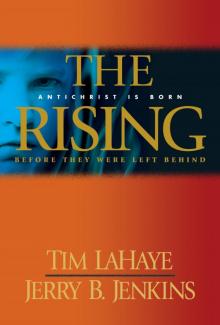 The Rising: Antichrist is Born / Before They Were Left Behind
The Rising: Antichrist is Born / Before They Were Left Behind Babylon Rising: The Edge of Darkness
Babylon Rising: The Edge of Darkness 03 The Europa Conspiracy
03 The Europa Conspiracy Desecration
Desecration Left Behind
Left Behind The Remnant
The Remnant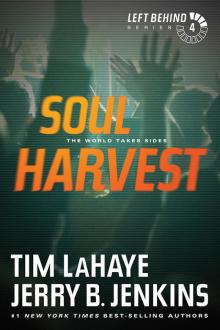 Soul Harvest
Soul Harvest Left Behind Book 13: Kingdom Come The Final Victory
Left Behind Book 13: Kingdom Come The Final Victory Apollyon
Apollyon 02 Thunder of Heaven: A Joshua Jordan Novel
02 Thunder of Heaven: A Joshua Jordan Novel Glorious Appearing
Glorious Appearing The Rapture: Evil Advances / Before They Were Left Behind
The Rapture: Evil Advances / Before They Were Left Behind Edge of Apocalypse
Edge of Apocalypse Tribulation Force
Tribulation Force The Left Behind Collection: All 12 Books
The Left Behind Collection: All 12 Books Black Friday
Black Friday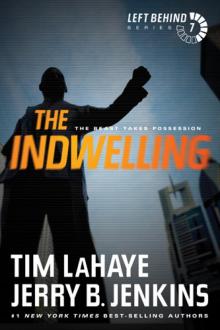 The Indwelling
The Indwelling The Left Behind Collection
The Left Behind Collection